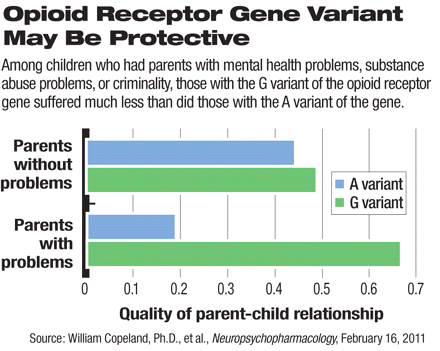An intriguing new study has found that opioid peptides—brain peptides that respond to pain—influence parent-child relationships.
The study sample—226 youth aged 9 to 17—was derived from a larger investigation of psychiatric illness and service use in youth in four rural North Carolina counties that have high poverty rates.
All participating children and teens were genotyped for the gene that makes the mu-opioid receptor, to which opioid peptides attach. Out of the 226 children, two-thirds had the A variant of the gene (that is, A/A), while the remaining third had the G variant (either G/G or G/A).
Each child and one of its parents (usually the mother) were then interviewed using the Child and Adolescent Psychiatric Assessment to obtain information about three aspects of their relationship during the previous three months—separation anxiety, enjoyment of parent-child activities, and parent-child arguments.
The researchers then assessed, after taking the youngsters' age and gender into consideration, whether there was a significant link between the mu-opioid receptor gene variant that a child possessed and his or her relationship with the parent during the previous three months.
There was such a relationship, they found. Interview findings indicated that children with the G variant indicated that they enjoyed parent-child activities significantly more, had significantly fewer parent-child arguments, and experienced significantly less separation anxiety than did children with the A variant.
Furthermore, the findings held even when mental health problems, substance abuse problems, or criminal convictions of the parents were considered.
"I think our findings may help explain why some children faced with adversity continue to do well and maintain a good relationship with their parents," William Copeland, Ph.D., an associate professor of psychiatry at Duke University and the lead investigator, told Psychiatric News. "We think this variant may be important for understanding social interactions, which are disrupted in many common psychiatric disorders … . It is probably premature, however, to start thinking about clinical implications. As cautious scientists, we are still interested in seeing this finding replicated in other samples."
In addition to benefiting parent-child relationships, the G variant of the opioid receptor gene also seems to confer another advantage—less pain sensitivity—and a disadvantage—an increased risk of substance dependence in adolescence and early adulthood, other researchers have found.
The study was funded by the National Institutes of Health.

